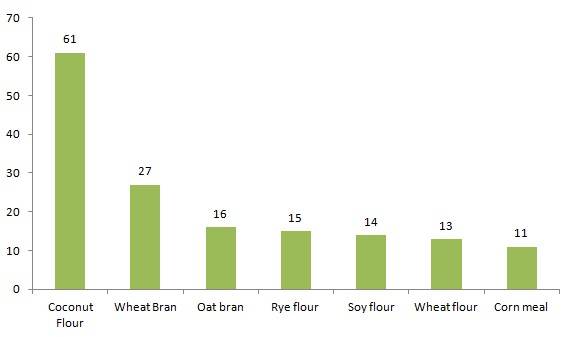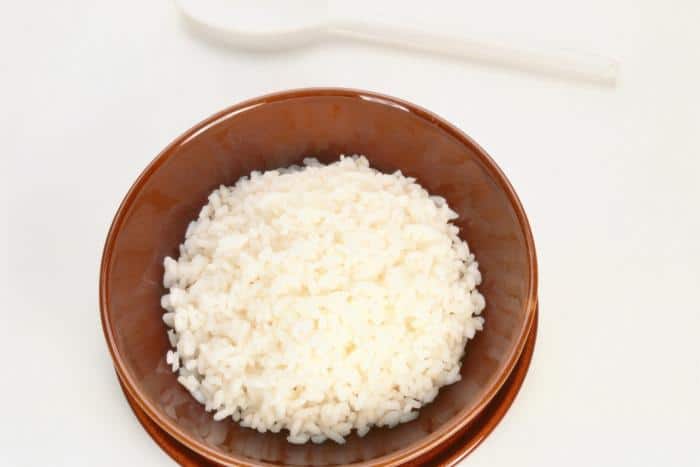We have already mentioned in many of our previous articles that including coconut in your diet and getting its health benefits is very easy because there are numerous ways to do so.
You can use coconut oil, coconut meat, coconut flour, coconut water and so on.
Cooking with coconut flour might be a new concept in many western countries but in tropical countries, it has been known since long.
Coconut flour is the best example how useful coconut is. Why so? Because coconut flour is not a product but actually a by-product of making coconut oil.
When oil from coconut meat is extracted the remaining material is ground and that becomes coconut flour! Thus nothing goes waste in this process.
Before talking about the health benefits of coconut flour, let's understand its nutritional value
Nutritional value of Coconut Flour
Here are key aspects of Coconut Flour nutrition -
1. Rich source of energy
Coconut flour is a rich source of energy. 100 gms of coconut flour provides 443 calories, 30% more than whole wheat flour. Even full fat soy flour is just able to match its calories.
Most of the energy by coconut flour is provided by carbohydrate, followed by fat. It is the presence of fat in coconut flour which accounts for its high energy as compared to wheat.
2. Carbohydrate and fibre
Carbohydrates are 60% of the total weight of coconut flour. This is lower than 72% in wheat flour. But coconut flour far exceeds in terms of dietary fibre which is close to 40 gms in 100 gms of coconut flour.
Wheat flour just contains 13% of dietary fibre by weight. This is what I was talking about when I said it is one of the richest sources of dietary fibre.
In fact, if you consume 100 gms of coconut flour, you get 150% of the required daily dosage of dietary fibre!
We have made a small chart to show this comparison - just note how high its fibre content is! Wheat bran and oat bran which are considered to be very rich in fibre have less than 50% of coconut flour!

3. Fats
Fats account for close to 15 of coconut flour by weight. Fats still remain in coconut flour as methods used to extract coconut oil from coconut meat are not able to fully extract the oil.
Most of the fats are saturated (in same lines as coconut meat).
Remember these are healthy medium chain fatty acids (also found in coconut oil) and are great for promoting heart and digestive health.
4. Proteins
Coconut flour has 17-18% protein by weight. This makes it a very rich source of protein ahead than whole wheat flour we use normally.
5. Minerals and vitamins
There are no vitamins and minerals present in coconut flour in a sizeable amount to have any significance except sodium.
Let's now discuss key health benefits of coconut flour.
Health Benefits of Coconut Flour
Coconut flour is full of nutrition and provides several health benefits. Its main health benefit is promoting digestive health and help in weight management. It is great for people who are gluten intolerant. It is also known to help people with high blood sugar.

So why bake using coconut flour? One of the key reasons for the benefit of coconut flour is that it is extremely rich in dietary fibre.
In fact, with 71% of the insoluble fibre of the total carbohydrate content, it has the highest percentage of dietary fibre present in any other flour you may find in the world! Here are some benefits of coconut flour:
1. Helps in maintaining digestive health
Dietary fibre present in coconut flour helps in cleaning the colon and promote intestinal health. It helps good bacteria to thrive in our gut and keeps check on harmful ones.
2. Gluten free
Many people around the world are gluten intolerant. The most popular flour we use has gluten in them, e.g. wheat. Coconut flour has NO gluten.
While coconut flour does have proteins as much as wheat but no gluten. This makes it an ideal flour for gluten intolerant people.
Several people use soy as an alternative to wheat as gluten-free flour, but studies have shown that soy flour can cause several diseases such as thyroid issues (in females), allergies, breast cancer, etc. So if you are using soy presently, try shifting to coconut flour as soon as possible.
3. Weight management
Eating fibre fills up stomach faster as it absorbs water and expands. One not only eats less but as coconut fibre has not nutrients it does not add any calories too. Thus keeping a check on weight.
4. Helps with blood sugar
Fibre is known to slow down the release of glucose. Foods with high
Using coconut flour in your diet
While there are several ways to use coconut flour in your diet, the best way to mix it with your usual flour. This ensures coconut flour remains in your diet without any extra effort.
If you are not used to cooking with coconut flour, you might face a few difficulties as it absorbs much more water than other flours and thus may feel dry. But with a little practice, you will realize how to tackle that issue.
Is baking with coconut flour easy: How is it different?
Yes, it is. But it is different too. Here are the key differences :
1. Gluten
Please understand coconut flour does not have the flexibility you get in wheat or other gluten-rich flours as it has no gluten. Thus, you require slight variation technique to cook with coconut flour.
2. Water Requirements
The second difference is that coconut flour demands lots of water as its fibre absorbs water quickly. Do not get surprised when you see your coconut flour become dry even after putting lots of water.
3. Not a Great Binder
it does not bind very well as you expect gluten flours. So you will feel that flour has lots of separate lumps. I have read that adding an egg helps here. It plays the role of gluten. As I am a pure vegetarian, I have not tested this method.
What can be done? here are some tips
Try to bake in a warm environment as lumping etc. may increase if the water and other ingredients are cold.
If you are not gluten intolerant than one of the best ways to include coconut flour is to add it to wheat. You can add one-fourth to one-third coconut flour with wheat.
This will not change the way of dealing with wheat flour much but you will have to add more water to account for coconut flour.
Also - the baking results may not be excellent the first time you use coconut flour. But with practice, it will!

can this coconut flour replace maize bran for poultry feed or does it have any adverse effect on birds?